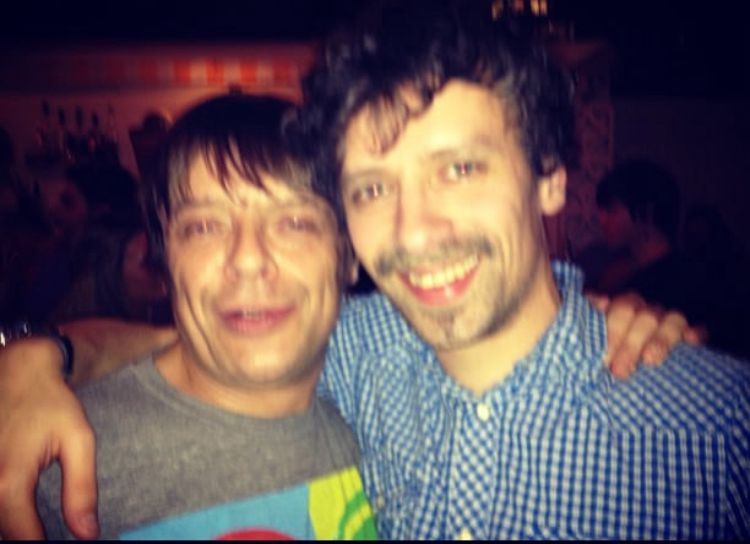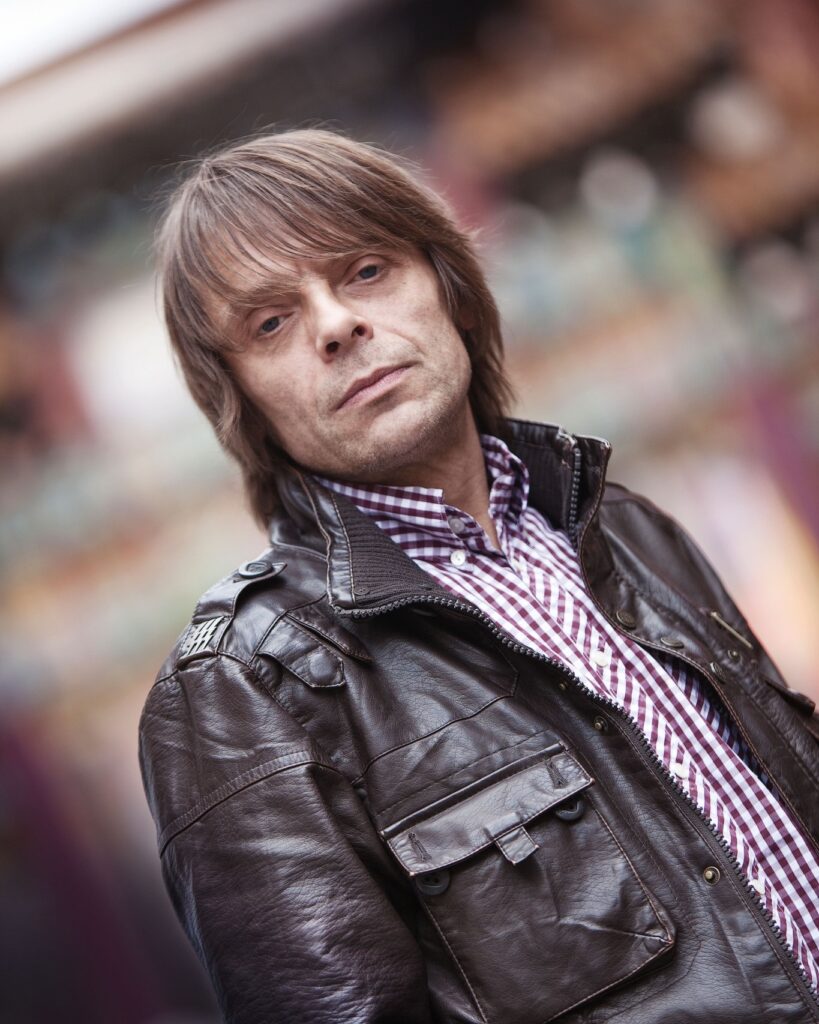There’s a real nostalgic binary when it comes to the present-day view of Mancunian music from the 80s and 90s: it’s easy to see it as an amorphous blob of naive youth culture, macho posturing, retrogressive English exceptionalism, Blairite flag-waving. There’s plenty of the music from that time and its legacy that has come to be a music stripped of any meaning, a cultural signifier without the substance to back it up, empty posturing that denotes Englishness as imperial supremacy, cultural hegemony, a static norm of fallacious British superiority.
And it’s easy to forget The Stone Roses were not that, for a bunch of reasons. One of the most important of them being Mani, and by extension how Mani and Reni, possibly the best rhythm section of the era, locked together loosely, in something that was far from macho rock braggadocio: in fact, its complete opposite. Many bands took the cue from the Roses’ self-confidence, their fuck-everybody-else self-belief, but forgot to write songs. The Roses had the songs, but that’s not even the most important bit – their belief, after all, was much more ‘we’re everything you’re not’ than ‘we’re better than you’ – yes, they had songs, but they had something else too.
The Roses were built on Mani’s tiptoe-light touch – something delicate but propulsive, an anti-rock energy that had heart, and was dreaming of something, borne of an internal rhythm and beauty that burnt a trail from itself outwards. In all the majesty of what John Squire was weaving, it needed Mani’s deft touch to live, as much as the skip and fire of Reni’s irrepressible combustion. On all sides it was supremely self-assured no doubt, but it was delicate, feminine, chaotic. It was able to utterly not give a fuck at the same time as being entirely of its own internal logic and beauty.
I’ve thought long and hard about what was different about the Roses. And what I’ve arrived at is they did not care. Inasmuch as they strived in iteration after iteration to reach something, to be recognised and remembered, they truly did not give a fuck. And that is punk rock, as far as I read it. The songs spoke for themselves, and in their pursuit of them the band arrived at something that cared not a bit for its success, as much as such success was completely assured. But having arrived there, they did not give a fuck. And here is the essence of Mani as much as of the Roses: the parts he wrote are often the simplest entry point into any piece of music he played: but in being so fundamentally anchored, so completely unadorned, they become everything. Mani’s playing is the life and soul of the Roses in microcosm, and he brought that energy to the whole history of the band, and indeed beyond, into much of his work in Primal Scream, especially on XTRMNTR.
So here’s where we arrive at Mani and the key thing that he brought not just to the Roses, but to that moment, to the canon, to the bass guitar. Mani, lest we forget, didn’t actually write the bass line to ‘I Wanna Be Adored’: it pre-dated his 1987 arrival in the band by a couple of years. But he embodied it, he gave it the swing that it needed for the sentiment of the song to finally make sense. The weight is much more with Mani in the band by 1989, but the weight is not a brow-beating, heavy thing. It is a deftness of touch, a lightness. If you compare the earlier demo of ‘I Wanna Be Adored’ from the Garage Flower tape, played by Pete Garner, to the later version, you hear how Mani transformed the Roses from a band with, yes, propulsive power – with songs even – to a band where the lightness of touch and the melodic energy could be allowed to breathe, and was all the more powerful for it. What you find in that music is space and swing and a singing, ringing note at its core, and that is all Mani (think of ‘Waterfall’. Think of the light swing of the three simple anchor notes in ‘Shoot You Down’, as John Squire moves sweetly, effortlessly around him).

I’ve lost count of the bass lines that were important to me, a burgeoning bass player eating up all the playing I could get my brain around. But I could list them. The winding twists of ’Something’s Burning’. ‘Elephant Stone’. The vertiginous ladder-climb of ‘One Love’. That plaintive moment in ‘Where Angels Play’ where the bass comes back in after Ian Brown’s “bang bang, bang bang…”, how it steps lightly down, down, up, down over Reni’s lifted hi-hats and tumbles across the floor tom. ‘Breaking Into Heaven’, which is of course ridiculous, but of all the overlapping stories on that song it’s Mani’s that’s the most compelling. ‘Love Spreads’ (listen to it isolated, MY GOD): this is before we even get to ‘Kill All Hippies’. All the menace, but in fact all the hope that lives on XTRMNTR comes from Mani’s parts on ‘Kill All Hippies’, on ‘Accelerator’, ‘Pills’, ’Shoot Speed / Kill Light’, ‘Swastika Eyes’. I have to stop somewhere, so I’ll stop there.
Others have written about the working class roots of the Roses, how their project was in part an anti-racist solidarity project no more typified by Mani. I know all too well that as a bass player, one is forced by necessity to become peacemaker: the bridge between incompatibilities in rhythm and melody, as much as between the ego of the songwriters and the requirements of the song. Mani, no doubt, was a pivotal figure as The Stone Roses navigated their endless misfortunes at Rockfield studios, through cocaine and broken arms, departures and disastrous festival appearances: the one who kept the show, just about, on the road, until there was no road left. We might see Mani, therefore, as the bass player’s bass player: the peacemaker’s peacemaker.
I have one cherished experience of meeting Mani, over the course of a week in 2012, playing on the same bill on a string of festival dates in Australia. Of all the people in that touring caravan, Mani was undoubtedly the most generous, the most cheerful, the most approachable. We shared drinks in hotel bars, and I listened to chuckled-through war stories, generally bathing in the affable spirit that he brought with him everywhere he went. And every night I could, I sat side of stage and watched Mani clang and grin his way through those songs, those bass lines; sometimes on a customised Rickenbacker bass, covered in razor blades by Damien Hirst (which we speculated might be the most expensive bass guitar ever played). The Roses weren’t quite the force I imagine they’d been back in the day, but I saw them, I watched Mani up-close, and I experienced those moments with a feeling of incredible privilege. Mani’s gone now, and his story mixed into Manchester folklore no doubt, but I’ll always have that memory to draw on, living on in my heart, much like the songs. Mani: the bass player’s bass player.


